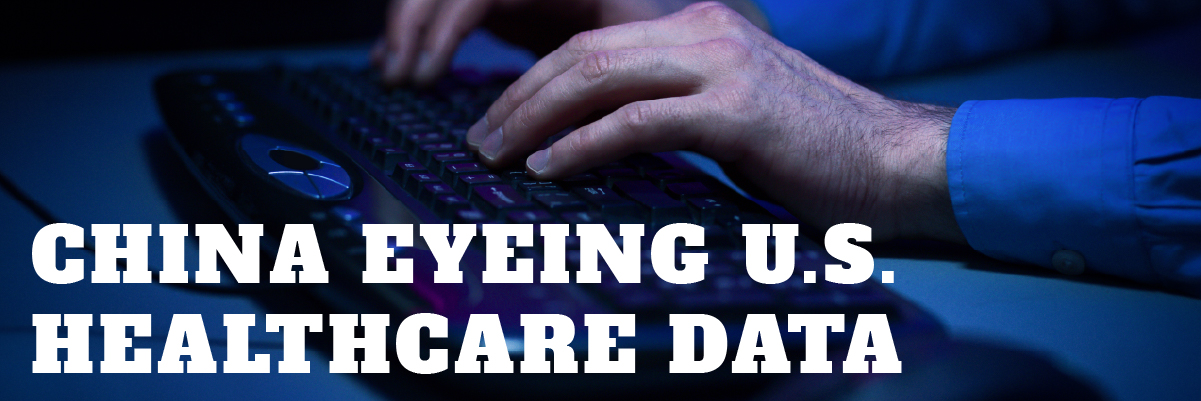China eyeing U.S. healthcare data
Do you want your PHI (protected health information) or DNA going to an authoritarian regime that has a history of using DNA for repression and surveillance? People’s Republic of China (PRC) has collected large sets of data from U.S. over the years, through every means possible. Access to American healthcare data now poses a serious risk to the privacy, economy, and national security of the United States.
The Covid-19 outbreak is only one part of the healthcare pandemic the country is suffering. The sudden dent in the healthcare infrastructure left the companies and the government reeling. As COVID rates and testing have requirements spiked, China’s BGI (Beijing Genomics Institute) Group, the world’s largest biotech and healthcare analytics company, proposed to help build and run advanced COVID testing labs throughout the U.S. BGI would provide technical expertise, high throughput sequencers, and even make financial donations for more research.
With America struggling to set up enough testing and research facilities, China’s proposal was hard to ignore in times of such desperation. That is until the U.S. National Counterintelligence and Security Center raised suspicion and warned against it.
“access to U.S. healthcare and genomic data by China poses serious national security and privacy risk for the United States.” The NCSC said in a statement. Apparently, the Chinese biotech group supplying the COVID-19 testing kits and helping to set up more than 18 research labs also planned on using samples to obtain healthcare data on American citizens, such as DNA and PHI.
China’s access to U.S. healthcare data
The People’s Republic of China (PRC) has been looking to obtain America’s ethnically diverse health data for years. According to National Counterintelligence and Security Center (NCSC), they have been able to gain access to US healthcare data, including genomic data, through a variety of channels, both legal and illegal, including theft of research and cyberattacks.”
#DYK: China has for years accessed U.S. genomic data through legal and illegal means. China’s DNA collection at home has helped it carry out human rights abuses. It’s collection of such data from America poses equally serious risks. See: https://t.co/zR5l1KuZZ8 pic.twitter.com/XCYj3CE0FZ
— NCSC (@NCSCgov) February 19, 2021
According to a report by CFR (Council of Foreign Relations), China already has more data on the genetic sequencing of the US population than the United States has on its own population.
Chinese companies invested in U.S. firms that handle sensitive personal and healthcare data, providing them with easy access to this US Electronic Health Records (EHR). For example, BGI purchased U.S. genomic sequencing company Complete Genomics in 2013, and China’s Wuxi Pharma acquired NextCODE Health in the U.S. and later formed Wuxi NextCODE Genomics.
Recent healthcare data breaches from hackers in China within the PRC government include the theft of personal data and EMRs. Anthem Inc. in 2015 lost healthcare data on roughly 78 million people; information including health identification numbers, names, Social Security numbers, employment, and income information. Two individuals based in China were indicted by the U.S. Justice Department for hacking Anthem and three other U.S. companies, in 2019.
The China Challenge
Bill Evania, a veteran of both the CIA and the FBI, also suspected that offer of help from BGI was a modern-day trojan horse. Using the labs as a way to establish a foothold in the U.S. healthcare market, much like previous corporate acquisitions, and then mining the health data even US Government agencies can’t access. Further, all Chinese companies are obligated to share data collected with the PRC government under the PRC’s national security laws. So any Chinese healthcare company on U.S. soil poses a national security risk.
We have seen the consequences in the past. The U.S. Department of Commerce sanctioned two subsidiaries of China’s BGI in July 2020 over the PRC government’s use of genetic techniques to repress Uyghurs and other Muslim minority groups in Xinjiang.
But how has this happened? China has taken the advantage of the loose safety and security infrastructure protecting our PHI and EMR. Policies need to be revamped concerning the sharing and control of these data at the national and international levels.
China’s BGI has collaborated with many American healthcare and research entities over the past decade, providing them with genomic sequencing services, as well as gaining access to health records and genetic information of U.S. citizens. But to date there are not enough regulations and policies to stop internal employees to share such information with other company employees, who just happen to also work for the Chinese government.
Conclusion and Diagnosis
“We have a short term approach to data management, solve the problem today, but that often leads to larger problems down the road.” – Richard Luna, CEO, Protected Harbor
To address the ever-growing surveillance capabilities of China and other authoritarian states, the U.S. and other nations should take bold action instead of timid, gentle steps. To begin with, the government needs to strengthen healthcare privacy legislation and regulation. Enhanced privacy laws would provide protections against only for foreign states, but also from domestic governments and private parties wishing access to protected healthcare data.
National healthcare IT organizations should also increase user safety and privacy, encryption, reporting, auditing, to enhance data transfer and internet openness. Since electronic health records (EHR) are now the norm, every healthcare organization must be sensitive to the intersection of health information, security, and must adhere to HIPAA compliances. HIPAA Security Rule involves many physical safeguards, technological measures, and organizational standards. It applies to technology in three key ways: technologies that store PHI must log out after a certain time to prevent unauthorized access, all users must be assigned unique logins that can be audited, and, PHI must be encrypted.
No healthcare IT department is alone in the battle to protect against illegal or legal healthcare data breaches. Partnering with reliable and secured healthcare IT solution expert such as Protected Harbor can help solve the issues at a grassroots level. With two organizations working together, the healthcare data industry can lay multiple pillars of healthcare data infrastructure to strengthen national security. We cannot accept our information as safe as is, given the scope of data collection on devices and China’s known involvement in this area. There are no checks and balances in the sharing of data. For example, a company allows the vendors access to the billing data to generate reports. But the vendor has access to ALL of the data, not just what’s needed to generate reporting. The IT department and cybersecurity U.S. needs to be heavily vested in the security and safety of data.
The U.S. has spent the last decade creating interoperable healthcare systems and China is now using legitimate interconnected companies to capture data. As a result of the COVID-19 outbreak, different technologies and data have been linked at a faster rate than security measures applied to the data. Millions of Americans have lost their DNA and personal information, allowing China to leverage our health information to develop artificial intelligence and precision medicine, putting America’s $100 billion biotechnology industry at a disadvantage. We need to cut the oxygen and this starts from the ground level moving up the ladder to the national level.





